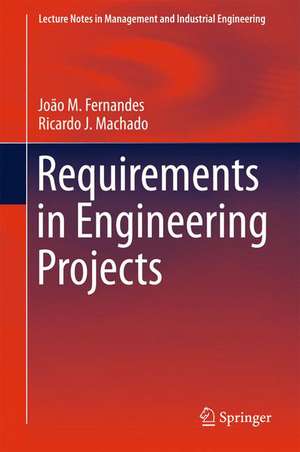Requirements in Engineering Projects: Lecture Notes in Management and Industrial Engineering
Autor João M. Fernandes, Ricardo J. Machadoen Limba Engleză Hardback – 27 iul 2015
It was written with the goal of being adopted as the main text for courses on requirements engineering, or as a strong reference to the topics of requirements in courses with a broader scope. It can also be used in vocational courses, for professionals interested in the software and information systems domain.
Readers who have finished this book will be able to:
- establish and plan a requirements engineering process within the development of
complex engineering systems;
- define and identify the types of relevant requirements in engineering projects;
- choose and apply the most appropriate techniques to elicit the requirements of a
given system;
- conduct and manage negotiation and prioritisation processes for the requirements
of a given engineering system;
- document the requirements of the system under development, either in natural
language or with graphical and formal models.
Each chapter includes a set of exercises.
| Toate formatele și edițiile | Preț | Express |
|---|---|---|
| Paperback (1) | 354.91 lei 39-44 zile | |
| Springer International Publishing – 15 oct 2016 | 354.91 lei 39-44 zile | |
| Hardback (1) | 368.24 lei 39-44 zile | |
| Springer International Publishing – 27 iul 2015 | 368.24 lei 39-44 zile |
Din seria Lecture Notes in Management and Industrial Engineering
- 18%
 Preț: 895.58 lei
Preț: 895.58 lei - 15%
 Preț: 657.39 lei
Preț: 657.39 lei - 18%
 Preț: 1227.52 lei
Preț: 1227.52 lei - 18%
 Preț: 1229.10 lei
Preț: 1229.10 lei - 18%
 Preț: 963.15 lei
Preț: 963.15 lei - 18%
 Preț: 1117.82 lei
Preț: 1117.82 lei - 15%
 Preț: 640.06 lei
Preț: 640.06 lei - 18%
 Preț: 1229.40 lei
Preț: 1229.40 lei - 18%
 Preț: 1378.41 lei
Preț: 1378.41 lei - 18%
 Preț: 1112.30 lei
Preț: 1112.30 lei - 24%
 Preț: 1054.18 lei
Preț: 1054.18 lei - 18%
 Preț: 1386.92 lei
Preț: 1386.92 lei - 18%
 Preț: 1221.07 lei
Preț: 1221.07 lei - 18%
 Preț: 1226.73 lei
Preț: 1226.73 lei - 18%
 Preț: 1000.87 lei
Preț: 1000.87 lei - 18%
 Preț: 1389.30 lei
Preț: 1389.30 lei - 15%
 Preț: 646.75 lei
Preț: 646.75 lei - 18%
 Preț: 1103.77 lei
Preț: 1103.77 lei - 24%
 Preț: 790.67 lei
Preț: 790.67 lei - 18%
 Preț: 1119.24 lei
Preț: 1119.24 lei - 18%
 Preț: 1383.49 lei
Preț: 1383.49 lei - 24%
 Preț: 806.63 lei
Preț: 806.63 lei - 20%
 Preț: 579.97 lei
Preț: 579.97 lei - 18%
 Preț: 946.24 lei
Preț: 946.24 lei - 18%
 Preț: 1233.69 lei
Preț: 1233.69 lei - 18%
 Preț: 1218.21 lei
Preț: 1218.21 lei - 24%
 Preț: 800.05 lei
Preț: 800.05 lei - 18%
 Preț: 1389.78 lei
Preț: 1389.78 lei - 18%
 Preț: 950.21 lei
Preț: 950.21 lei - 24%
 Preț: 1060.71 lei
Preț: 1060.71 lei - 20%
 Preț: 578.05 lei
Preț: 578.05 lei -
 Preț: 429.44 lei
Preț: 429.44 lei
Preț: 368.24 lei
Nou
Puncte Express: 552
Preț estimativ în valută:
70.47€ • 74.10$ • 58.22£
70.47€ • 74.10$ • 58.22£
Carte tipărită la comandă
Livrare economică 14-19 aprilie
Preluare comenzi: 021 569.72.76
Specificații
ISBN-13: 9783319185965
ISBN-10: 3319185969
Pagini: 250
Ilustrații: XVII, 225 p. 60 illus.
Dimensiuni: 155 x 235 x 20 mm
Greutate: 0.52 kg
Ediția:1st ed. 2016
Editura: Springer International Publishing
Colecția Springer
Seria Lecture Notes in Management and Industrial Engineering
Locul publicării:Cham, Switzerland
ISBN-10: 3319185969
Pagini: 250
Ilustrații: XVII, 225 p. 60 illus.
Dimensiuni: 155 x 235 x 20 mm
Greutate: 0.52 kg
Ediția:1st ed. 2016
Editura: Springer International Publishing
Colecția Springer
Seria Lecture Notes in Management and Industrial Engineering
Locul publicării:Cham, Switzerland
Public țintă
GraduateCuprins
1 Presentation of the book.- 1.1 Introduction.- 1.2 Objectives of the book.- 1.3 Structure of the book.- 1.4 Taxonomical issues.- 1.5 About the authors.- 2 Software engineering.- 2.1 Contributions for requirements engineering.- 2.2 Characterisation of the discipline.- 2.3 Software.- 2.3.1 Definition of software.- 2.3.2 Software systems and products.- 2.3.3 Domains.- 2.4 Models for the development process.- 2.4.1 Waterfall.- 2.4.2 Incremental and iterative.- 2.4.3 Transformational.- 2.4.4 Spiral.- 2.5 Summary.- Further reading.- Exercises.- 3 Requirements.- 3.1 Definition of requirement.- 3.2 Functional requirements.- 3.3 Non-functional requirements.- 3.3.1 Appearance.- 3.3.2 Usability.- 3.3.3 Performance.- 3.3.4 Operational.- 3.3.5 Maintenance and support.- 3.3.6 Security.- 3.3.7 Cultural and political.- 3.3.8 Legal.- 3.4 User and system requirements.- 3.5 Related concepts.- 3.6 Summary.- Further reading.- Exercises.- 4 Requirements engineering.- 4.1 Definition of requirements engineering.- 4.2 Activities.- 4.3 Challenges and problems.- 4.4 Summary.- Further reading.- Exercises.- 5 Requirements elicitation.- 5.1 Process.- 5.2 Identification of the stakeholders.- 5.3 Techniques.- 5.3.1 Individuals.- 5.3.2 Groups of persons.- 5.3.3 Artefacts.- 5.4 Summary.- Further reading.- Exercises.- 6 Requirements negotiation and prioritisation.- 6.1 Requirements negotiation.- 6.1.1 Negotiation process.- 6.1.2 Postures and strategies.- 6.2 Requirements prioritisation.- 6.2.1 Criteria and scales.- 6.2.2 Techniques.- 6.3 Summary.- Further reading.- Exercises.- 7 Writing in a natural language.- 7.1 Guidelines for writing.- 7.1.1 Issues to consider.- 7.1.2 Issues to avoid.- 7.2 Template for the requirements document.- 7.3 Ambiguity.- 7.4 Summary.- Further reading.- Exercises.- 8 Modelling.- 8.1 Definition of model.- 8.2 Model dimensions.- 8.3 Modelling ontology.- 8.3.1 System and model.- 8.3.2 Specification.- 8.3.3 Language.- 8.3.4 Mental models.- 8.3.5 Model of computation.-8.3.6 Reverse engineering perspective.- 8.3.7 Analogies.- 8.4 Models for requirements.- 8.4.1 Domain models.- 8.4.2 Use case models.- 8.4.3 Class models.- 8.4.4 Sequence models.- 8.4.5 State models.- 8.4.6 Activity models.- 8.5 Summary.- Further reading.- Exercises.- Glossary.- References.- Index.
Notă biografică
João M. Fernandes and Ricardo J. Machado are Full Professors at the School of Engineering, Universidade do Minho, Portugal. They are active in the software and information systems domain for more than 20 years. Within their research activities, they regularly maintain collaborations with several industrial partners by conducting complex engineering projects.
Prof. Fernandes conducts his research activities in software engineering, with a special interest in software modelling, requirements engineering, and embedded software. He was invited professor/researcher at U. Bristol (1991), Abo Akademi (2002-03), ISCTEM (2003), U. Algarve (2004-06), U. Aarhus (2006--07), and UFSC (2013).
Prof. Machado conducts research activities and has coordinated more than 50 research projects in the field of information systems engineering, with a special interest in modelling approaches
for analysis and design, and in process and project management life-cycles. He is a founding member of the IEEE-IES Technical Committee on Education in Engineering and Industrial Technologies.
In 2009, he received the IEEE MGA Achievement Award.
Prof. Fernandes conducts his research activities in software engineering, with a special interest in software modelling, requirements engineering, and embedded software. He was invited professor/researcher at U. Bristol (1991), Abo Akademi (2002-03), ISCTEM (2003), U. Algarve (2004-06), U. Aarhus (2006--07), and UFSC (2013).
Prof. Machado conducts research activities and has coordinated more than 50 research projects in the field of information systems engineering, with a special interest in modelling approaches
for analysis and design, and in process and project management life-cycles. He is a founding member of the IEEE-IES Technical Committee on Education in Engineering and Industrial Technologies.
In 2009, he received the IEEE MGA Achievement Award.
Textul de pe ultima copertă
This book focuses on various topics related to engineering and management of requirements, in particular elicitation, negotiation, prioritisation, and documentation (whether with natural languages or with graphical models). The book provides methods and techniques that help to characterise, in a systematic manner, the requirements of the intended engineering system.
It was written with the goal of being adopted as the main text for courses on requirements engineering, or as a strong reference to the topics of requirements in courses with a broader scope. It can also be used in vocational courses, for professionals interested in the software and information systems domain.
Readers who have finished this book will be able to:
- establish and plan a requirements engineering process within the development of
complex engineering systems;
- define and identify the types of relevant requirements in engineering projects;
- choose and apply the most appropriate techniques to elicit the requirements of a
given system;
- conduct and manage negotiation and prioritisation processes for the requirements
of a given engineering system;
- document the requirements of the system under development, either in natural
language or with graphical and formal models.
Each chapter includes a set of exercises.
It was written with the goal of being adopted as the main text for courses on requirements engineering, or as a strong reference to the topics of requirements in courses with a broader scope. It can also be used in vocational courses, for professionals interested in the software and information systems domain.
Readers who have finished this book will be able to:
- establish and plan a requirements engineering process within the development of
complex engineering systems;
- define and identify the types of relevant requirements in engineering projects;
- choose and apply the most appropriate techniques to elicit the requirements of a
given system;
- conduct and manage negotiation and prioritisation processes for the requirements
of a given engineering system;
- document the requirements of the system under development, either in natural
language or with graphical and formal models.
Each chapter includes a set of exercises.
Caracteristici
Includes exercises in all the chapters, providing students with the mechanisms to apply/test knowledge, techniques and approaches presented in the book Offers a judicious choice of RE topics, focusing on requirements elicitation, negotiation and documentation Provides many examples on the topics for systems in the software domain and other engineering fields Includes supplementary material: sn.pub/extras









